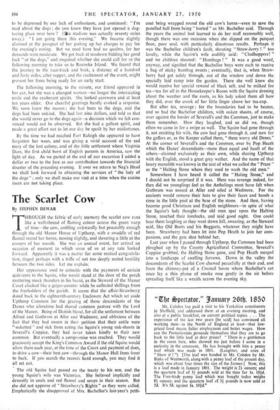The Scarlet Cow
By STEPHEN DEWAR THROUGH the fabric of early memory the scarlet cow runs like a weft-thread of flaming colour across the green warp of time—the cow, ambling awkwardly but peaceably enough through the old Manor House of Upthorp, with a swaddle of red flannel round her horns, mooing slightly, and slavering a little at the corners of her mouth. She was an annual event, her arrival an occasion of moment to which some of us at any rate looked forward. Apparently it was a matter for some mutual congratula- tion, tinged perhaps with a trifle of not too deeply seated hostility between the two sides. Let me explain.
Her appearance used to coincide with the payments of certain quit-rents to the Squire, who would stand at the door of the porch muttering mock thunders in his beard, as the Steward of the Manor Court clucked like a geiger-counter while he collected shillings from the freeholders of the parish. It seems that the affair-Strawberry dated back to the eighteenth-century Enclosure Act which set aside Upthorp Common for the grazing of those descendants of the Danes who aforetime had shared common pasture with the Lord of the Manor. Being of Danish blood, for all the settlement between Alfred and Guthrum at Aller and Wedmore, and oblivious of the fact that they had sworn in their petition that their cattle were " oaketted " and sick from eating the Squire's young oak-shoots in Severall's Coppice, they had never taken kindly to their new common. But eventually a compromise was reached. They would graciously accept the King's Common Award if the old Squire would allow them each year, at the time of the Court and payment of dues, to drive a cow—their best cow—through the Manor Hall from front to back. If you search the records hard enough, you may find it all set out.
The old Squire had passed on the treaty to his son, and the young Squire's wife was Victorian. She believed implicitly and devoutly in coals and red flannel and soups in their season. But she did not approve of "Strawberry's Rights" as they were called. Emphatically she disapproved of Mrs. Bachelor's last-year's petti- coat being wrapped round the old cow's horns—even to save the panelled hall from being " hurted " as Mr. Bachelor said. Through the years the animal had learned to do her stuff reasonably well, though there was one occasion when she slipped on the parquet floor, poor soul, with particularly disastrous results. Perhaps it was the Bachellor children's fault, shouting "Straw-berry ! " too loudly, while the Squire's wife audibly said: " Clodhoppers! " and we children shouted : "Humbugs ! " It was a good word, anyway, and signified that the Bachellor boys were each to receive a bag of sticky humbug sweets ; eventually, that is, when Straw- berry had got safely through, out of the window and down the specially laid ramp into the garden. There she well knew she would receive her special reward of black salt, and be milked for tea—tea for all in the Housekeeper's Room with the Squire droning about the weather and the roots, as his lady asked them all how they did, over the crook of her little finger above her tea-cup.
But after tea, revenge ; for the boundaries had to be beaten, and so had the Bachellor children, with oaken shoots, of course, over against the border of Severall's and the Common, just to make them remember. How they laughed, and so did we, though often we came in for a swipe as well. The Squire had gone through it, not omitting his wife, the cow had gone through it, and now for the gaffers or, as the Keeper called them, "them warry old Denes." At the corner of Severall's and the Common, over by Pop Heath which the Danes' descendants—more than equal and hault of the others—claimed exclusively as their own, while sharing Upthorp with the English, stood a great grey wether. And the name of that hoary monolith was known in the text of what we called the " Pram " as the "Halting Stone where they used to wash the old men."
Somewhere I have heard it called the "Hating Stone," and I should not be surprised if it was. Here was revenge indeed, for then did we younglings feel as the Aethelings must have felt when Guthrum was soused at Aller and oiled at Wedmore. For the ancients would remove their hats to give their faces and hands a rinse in the little pool at the base of the stone. And then, having become good Christians and English neighbours—in spite of what the Squire's lady thought—the old men spat upon the Halting Stone, touched their forelocks, and said good night. One could hear them laughing as they went down hill, swearing, as the Steward said, like Old Boots and his Boggarts, whatever they might have been. Strawberry had been let into Pop Heath to join her com- panions, and the gate shut behind her.
Last year when I passed through Upthorp, the Common had been ploughed up by the County Agricultural Committee, Severall's Coppice grubbed, the Halting Stone gone, and Pop Heath merged into a landscape of swelling furrows. Down in the valley the descendants of the Scarlet Cow chewed peacefully at their cud, and from the chimney-pot of a Council house where Bachellor's cot once lay a thin plume of smoke rose gently in the air before spreading itself like a wraith across the evening sky.










































 Previous page
Previous page